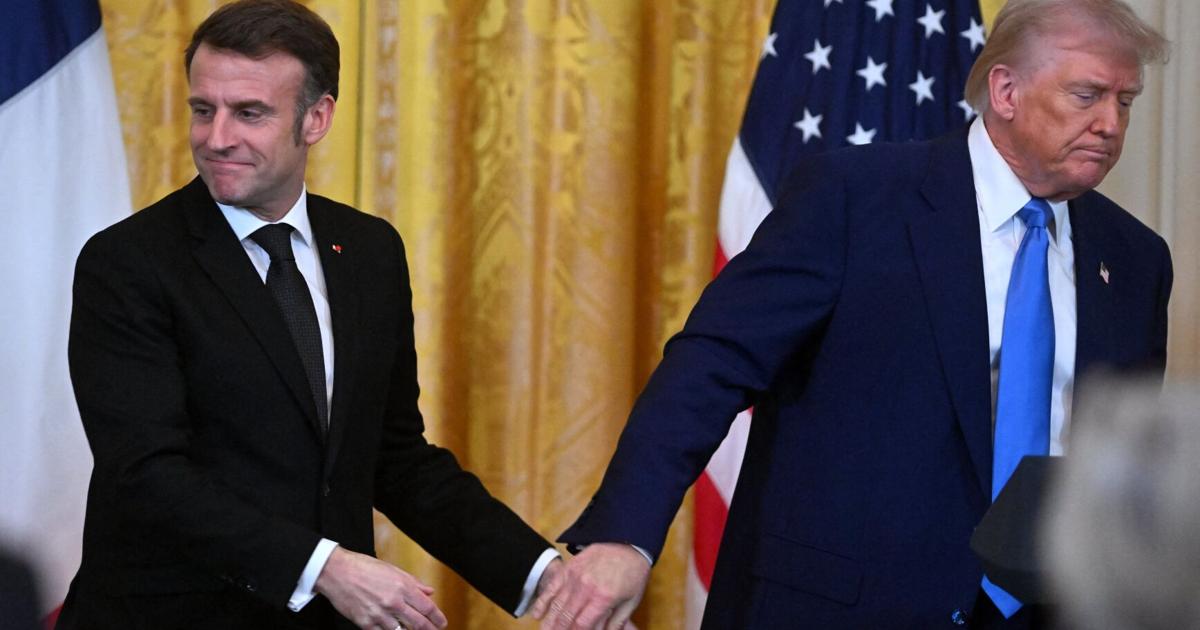OTTAWA — Despite weeks of Canadian efforts to tighten border security to prevent tariffs, U.S. President Donald Trump says 25 per cent import duties on Canadian and Mexican products will go ahead next week.
The first round of tariffs, which the president initially directly tied to fixing what he condemned as an illegal influx of fentanyl and migrants coming across America’s southern and northern borders, are set to take effect on Mar. 4.
On Monday, Mélanie Joly, Canada’s foreign affairs minister, pushed back, saying the U.S. is a “net exporter” of illegal fentanyl, guns and migrants to Canada.
Joly, speaking at a virtual news conference from London, told reporters she was not aware of Trump’s specific remarks earlier Monday but stressed that “we need to be aware that the threat of tariffs is a real one, and may continue for a while.”
Canada is ready for “all scenarios,” Joly said, and while not alone in facing Trump’s economic threats, is “the only country on earth” to stand up and publicly outline a retaliatory plan to impose counter-tariffs on $155 billion worth of American imports if Trump proceeds.
Joly said Trump and Prime Minister Justin Trudeau had a “constructive” phone call on Saturday focused mostly on the war in Ukraine.
Trump and Trudeau spoke again during a G7 leaders’ call Monday on Ukraine, with Trump posting on social media that the call was led by “Governor Justin Trudeau of Canada.” Joly said Trudeau had flagged to Trump Canada’s work on the border on Saturday, and said government has had “positive” feedback from American officials on its $1.5-billion plan to boost border security — one she said Canada is doing to stop the northward flow of fentanyl, guns and migrants.
However, she suggested, Ottawa has no guarantee any of it is enough to exempt Canada from next week’s threat.
So officials will continue to argue that the trading relationship with the U.S. “greatly” benefits America, she said, “but at the same time, we will defend Canadian jobs. We will absolutely fight back, and we will be there to defend Canada’s and Canadians’ way of living.”
Trump, at a joint news conference with French President Emmanuel Macron, was asked directly about the looming Mar. 4 deadline that he agreed to when he set a 30-day delay on punitive measures on Canada and Mexico.
Those tariffs would mean a 25 per cent import tax on most Canadian products, though only a 10 per cent charge on oil and gas, reflecting a greater American dependence on Canadian energy exports.
When a reporter asked Monday if the two countries had done enough to stop the tariffs, Trump replied, “We’re on time with the tariffs, and it seems like that’s moving along very rapidly.
“We’ve been mistreated very badly by many countries, not just Canada and Mexico,” Trump added.
Trump has since also threatened to stack — on top of the 25 per cent “across-the-board” tariffs tied to border measures — a separate 25 per cent tariff on steel and aluminum from Canada and other countries in a bid to bring manufacturing back to the U.S.
Additionally, the president in the past two weeks has piled on separate tariff threats for foreign cars including from Canada, Canadian lumber, imports of semi-conductor chips and pharmaceuticals, as well as what he calls global “reciprocal tariffs”— aimed at correcting what Trump views as unfair sales taxes on U.S. goods in foreign countries, unfair export subsidies, and unfair digital services taxes that countries like Canada and France have levied on big American tech companies.
Trump said he blames his predecessor, saying other countries took advantage of the United States “on manufacturing, on just about everything.”
“No, the tariffs are going forward, on time, on schedule,” Trump said Monday. He again suggested “reciprocal tariffs” will level the playing field and raise revenues for the U.S. Treasury, saying “our country will be extremely liquid, and rich again.”
Flavio Volpe, head of Canada’s Automotive Parts Manufacturers’ Association, said in an interview it is not surprising.
Volpe did not expect Trump would, eight days ahead of the first tariff deadline, back down, and believes the president is trying to pressure Canada and Mexico on a number of fronts in order to expedite a renegotiation of the three-way continental free trade pact that Trump signed in 2019.
Trump didn’t specifically reference the CUSMA, as it’s called in Canada, but he did trash-talk unspecified trade agreements Monday, saying, “I look at some of these agreements, I’d read ‘em at night and say ‘who would ever sign a thing like this?’ ”
“The net effect of all his threats has been to create market uncertainty,” Volpe said. “Why would he calm the markets today?
“With market uncertainty, their bet is that companies and investors will bet on the promised land which in his mind is the United States.”
That uncertainty has given many investors pause, with some companies like Stellantis shifting production plans. Others are simply delaying decisions for now.
In the short term, Trump’s comments set up “for another meeting on the brink” next week, said Volpe, as the Canadian government, premiers, and business, union and industry leaders try to figure out how to avoid the threats.



